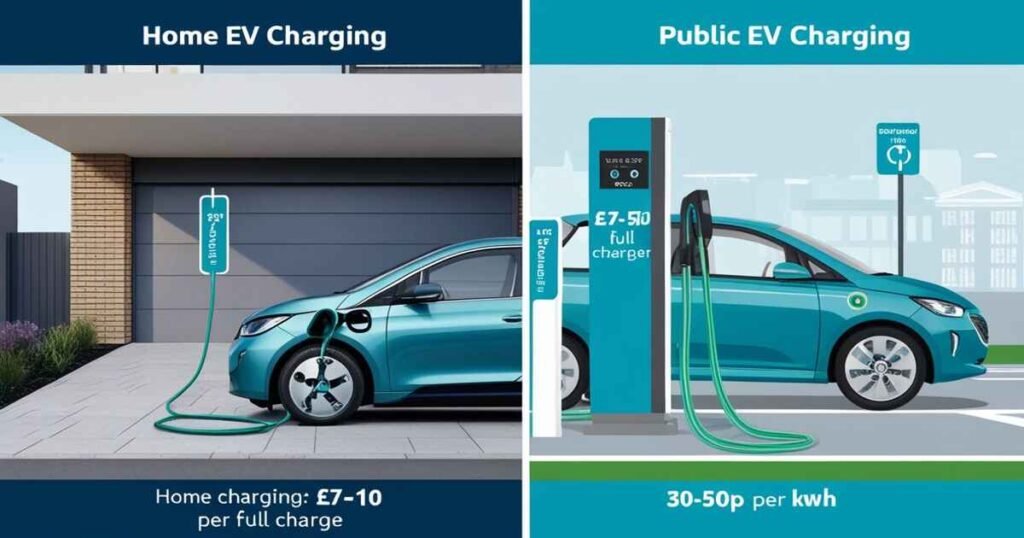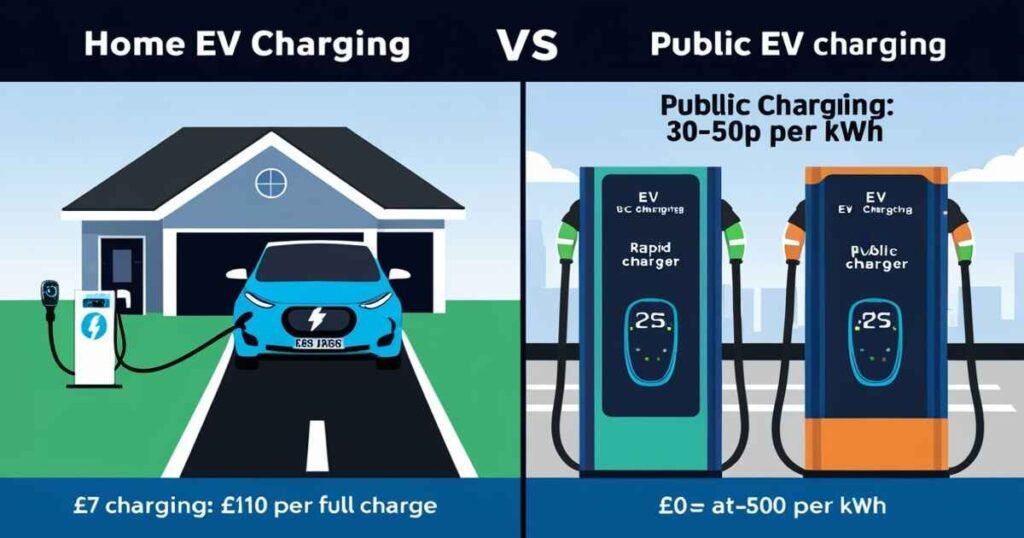The Home vs Public Charging Comparison 2024 is crucial for electric vehicle (EV) owners debating the best way to charge their cars. Should they invest in a home charger or rely on public charging networks? While both options have their merits, understanding this comparison helps you make an informed decision based on your lifestyle and driving habits.
Home Charging Costs
Installation Costs
One of the first expenses for EV owners considering home charging is the installation of a home charger. In the UK, the cost typically ranges between £500 and £1,500, depending on the charger type and any required electrical upgrades. Fortunately, schemes like the OZEV grant can reduce the financial burden, offering up to £350 towards the installation cost for eligible applicants (UK Government ).
Expert Insight: “Home charging is increasingly the most economical option for frequent EV users, especially with off-peak tariffs,” says John Smith, CEO of BP Pulse (BP Pulse (https://www.bppulse.co.uk)).
Electricity Costs
Charging your EV at home can be more affordable than public alternatives, especially if you take advantage of off-peak rates like those offered by Economy 7. On average, home electricity costs for EV charging are around 17p per kWh, translating to roughly £7-£10 for a full charge (Energy Saving Trust). This cost can be further reduced by scheduling charging sessions during off-peak hours.
User Testimonial: Sophie, an EV driver from Manchester, shared, “Installing a home charger was initially expensive, but the savings on electricity costs have made it worthwhile, especially with night rates.”
Case Study: Green Wheels, a fleet company, reported a 20% reduction in operational costs after switching to primarily home-based charging solutions for their electric vans. Their analysis indicated significant savings on energy costs, particularly by leveraging off-peak tariffs—an essential consideration in the home vs public charging comparison for 2024 (Fleet News).
Maintenance and Other Costs
Apart from the initial setup, home charging incurs minimal ongoing costs. Maintenance is generally limited to occasional checks and potential upgrades to keep your charger compatible with newer models. These low maintenance costs make home charging a sustainable choice for many drivers, which is important when assessing the home vs public charging comparison for 2024. Installing a smart meter can also help monitor and optimize energy usage (UK Power Networks).
Public Charging Costs
Types of Public Charging Stations
Public chargers are classified into three types: rapid, fast, and slow. Rapid chargers (50 kW+) are the quickest, providing an 80% charge in under an hour, while fast chargers (7-22 kW) and slow chargers (3-7 kW) take longer. The type of charger used influences the cost per session, which is a crucial consideration in the home vs public charging comparison for 2024.
Charging Fees
Public charging rates vary, with some networks charging around 30-40p per kWh. Rapid charging stations, often found at motorway service areas, can charge up to 50p per kWh or more (UK Department for Transport). While convenient for long trips, frequent use of rapid chargers can become expensive compared to home charging rates.
Industry Expert: “While public charging provides flexibility, the costs can add up, especially for rapid charging sessions,” explains Sarah Green, an analyst at Pod Point (Pod Point (https://pod-point.com)).
Membership Fees
Certain networks offer subscription plans that can reduce per-session costs. For instance, BP Pulse provides a subscription service for around £7.85 per month, which offers lower per-kWh rates and access to exclusive charging stations. However, these plans require frequent use to justify the cost and may not always be cost-effective for occasional users.
Additional Costs
Public charging may also include parking fees, particularly in city centers or shopping malls. Additionally, time restrictions might apply, which could incur extra costs if overstayed. These factors are important in the overall home vs public charging comparison for 2024, as hidden fees can significantly increase costs for EV owners relying on public infrastructure.
Cost Comparison Analysis
Short-Term vs. Long-Term Costs
While the initial investment for home charging is higher, it tends to be more cost-effective over time, especially for regular EV users. Public charging can be a viable option for occasional users or those without access to a dedicated parking space. This home vs public charging comparison in 2024 highlights the importance of understanding both immediate and future costs when planning your EV strategy.
Frequency and Type of Use
For daily commuters, home charging is typically the cheaper and more convenient option. On the other hand, for long trips or users in urban areas without home chargers, public stations offer flexibility, albeit at a higher cost. This scenario is critical in the home vs public charging comparison for 2024, as the type and frequency of use influence which option is more economical.
Convenience vs. Cost
Choosing between home and public charging often boils down to convenience. While home charging is more economical, public networks provide accessibility across the UK. Understanding the trade-offs in the home vs. public charging comparison for 2024 can help determine the most cost-effective solution for your needs.
Home vs Public Charging Comparison Table
| Feature | Home Charging | Public Charging |
|---|---|---|
| Cost per kWh | Approx. 17p per kWh (can be lower with off-peak tariffs) | 30-50p per kWh (varies by location and provider) |
| Initial Setup Cost | £500 – £1,500 (installation and equipment) | No initial setup cost |
| Convenience | High – Charge overnight at home | Medium – Requires travel to public stations |
| Charging Speed | Slower – Typically 7-22 kW (may take several hours) | Faster – Rapid chargers available (50 kW+ for quick charge) |
| Flexibility | Limited to where the charger is installed (e.g., home) | High – Available at various locations across the UK |
| Maintenance | Minimal – Occasional checks and updates | No personal responsibility for maintenance |
| Additional Costs | Minimal – Only electricity costs | Potential parking fees, subscription fees, or time limits |
| Long-term Savings | High – Lower per kWh rates and potential grants available | Lower – Higher per kWh rates can add up over time |
| Grants Available | Yes – Up to £350 (OZEV grant) | No grants available |
| Best For | Regular, daily commuters with access to private parking | Occasional users, long trips, or those without home parking |
Internal Link
To learn more about choosing the right EV charger for your home, check out our comprehensive guide: Top 7 Best Home EV Chargers UK: Powerful Choices (2024).
FAQs
What is the average cost to install a home EV charger in the UK?
- The average cost ranges from £500 to £1,500, depending on the charger type and electrical upgrades. Eligible applicants can receive up to £350 off through the OZEV grant (UK Government (https://www.gov.uk/government/collections/government-grants-for-low-emission-vehicles)).
How much does it cost to charge an electric car at home?
- Home electricity costs for EV charging are around 17p per kWh, translating to £7-£10 for a full charge (Energy Saving Trust (https://energysavingtrust.org.uk/advice/electric-vehicles/)).
Is home charging cheaper than using public charging stations?
- Yes, home charging is generally cheaper than public charging stations. Public stations, especially rapid chargers, can charge up to 50p per kWh, which is significantly higher than home rates.
What are the costs associated with public charging networks?
- Costs vary by provider and charger type, typically between 30-50p per kWh. Subscription plans may reduce rates but come with monthly fees.
Are there any grants available for installing a home charger in the UK?
- Yes, the UK government offers the OZEV grant, which provides up to £350 towards the installation of a home EV charger (UK Government (https://www.gov.uk/government/collections/government-grants-for-low-emission-vehicles)).
What is the difference between rapid, fast, and slow public chargers?
- Rapid chargers (50 kW+) charge up to 80% in under an hour, fast chargers (7-22 kW) take a few hours, and slow chargers (3-7 kW) require overnight charging.
Conclusion
Both home and public charging options have their advantages and costs. This detailed home vs. public charging comparison for 2024 highlights that while home charging offers long-term savings, particularly for frequent drivers, public charging provides flexibility for those on the go or without access to a private charger. Evaluate your driving habits, access to charging infrastructure, and budget to make the best decision for your electric vehicle journey.
Call to Action: Subscribe to our newsletter for the latest updates on EV technology and receive a free “Ultimate EV Charging Guide” tailored to help you optimize your charging habits.
Explore more guides on our blog to stay informed and make the best choices for your electric vehicle lifestyle.


